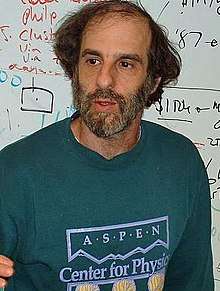Paul Ginsparg
Paul Henry Ginsparg (born January 1, 1955) is a physicist. He developed the arXiv.org e-print archive.[1][2][3]
Paul Ginsparg | |
|---|---|
 Paul Ginsparg in 2006 | |
| Born | Paul Henry Ginsparg January 1, 1955 |
| Alma mater | Harvard University (B.A.) Cornell University (Ph.D.) |
| Known for | ArXiv |
| Awards | MacArthur Fellowship |
| Scientific career | |
| Institutions | Cornell University |
| Thesis | Aspects of Symmetry Behavior in Quantum Field Theory (1981) |
| Doctoral advisor | Kenneth G. Wilson[1] |
| Website | physics |
Education
He is a graduate of Syosset High School in Syosset, New York. He graduated from Harvard University with a Bachelor of Arts in physics and from Cornell University with a PhD in theoretical particle physics with a thesis titled Aspects of Symmetry Behavior in Quantum Field Theory.
Career in physics
Ginsparg was a junior fellow and taught in the physics department at Harvard University until 1990.[4] The pre-print archive was developed while he was a member of staff of Los Alamos National Laboratory, 1990–2001. Since 2001, Ginsparg has been a professor of Physics and Computing & Information Science at Cornell University.[5]
He has published physics papers in the areas of quantum field theory, string theory, conformal field theory, and quantum gravity. He often comments on the changing world of physics in the Information Age.[6][7][8][9][10][11]
Awards
He has been awarded the P.A.M. (Physics-Astronomy-Math) Award from the Special Libraries Association,[12] named a Lingua Franca "Tech 20", elected as a Fellow of the American Physical Society, awarded a MacArthur Fellowship in 2002,[13] received the Council of Science Editors Award for Meritorious Achievement, and received the Paul Evans Peters Award from Educause, ARL, and CNI.[14] He was a Radcliffe Institute Fellow in 2008–2009.[4] He was named a White House Champion of Change June 2013.[15]
Family
He has two children - a daughter, Miryam Ginsparg (b. 2000), and a son, Noam Ginsparg (b. 2004). His wife is Laura Jones, a mathematical biologist and researcher.
Publications
- "Creating a global knowledge network", UNESCO Expert Conference on Electronic Publishing in Science, Paris, 19–23 February 2001, Second Joint ICSU Press
- Fluctuating geometries in statistical mechanics and field theory, Editors François David, Paul Ginsparg, Jean Zinn-Justin, Elsevier, 1996, ISBN 978-0-444-82294-9
- "First Steps toward Electronic Research Communication", Gateways to knowledge: the role of academic libraries in teaching, learning, and research, Editor Lawrence Dowler, MIT Press, 1997, ISBN 978-0-262-04159-1
- Ginsparg, P. (2006). "As We May Read". Journal of Neuroscience. 26 (38): 9606–9608. doi:10.1523/JNEUROSCI.3161-06.2006. PMC 6674456. PMID 16988030.
- Ginsparg, P.; Houle, P.; Joachims, T.; Sul, J. (2004). "Mapping subsets of scholarly information". Proceedings of the National Academy of Sciences. 101: 5236–5240. arXiv:cs/0312018. Bibcode:2004PNAS..101.5236G. doi:10.1073/pnas.0308253100. PMC 387301. PMID 14766973.
- Bachrach, S.; Berry, R.; Blume, M.; Von Foerster, T.; Fowler, A.; Ginsparg, P.; Heller, S.; Kestner, N.; Odlyzko, A.; Okerson, A.; Wigington, R.; Moffat, A. (1998). "Who should own scientific papers?". Science. 281 (5382): 1459–1460. Bibcode:1998Sci...281.1459B. doi:10.1126/science.281.5382.1459. PMID 9750115.
- Freedman, D.; Ginsparg, P.; Sommerfield, C.; Warner, N. (1987). "String-ghost interactions and the trace anomaly". Physical Review D. 36 (6): 1800–1818. Bibcode:1987PhRvD..36.1800F. doi:10.1103/physrevd.36.1800. PMID 9958364.
- Ginsparg, P. (1987). "On toroidal compactification of heterotic superstrings". Physical Review D. 35 (2): 648–654. Bibcode:1987PhRvD..35..648G. doi:10.1103/physrevd.35.648. PMID 9957701.
Notes
- Ginsparg, Paul (2011). "It was twenty years ago today.". arXiv:1108.2700v1 [cs.DL].
- Ginsparg, P. (2011). "ArXiv at 20". Nature. 476 (7359): 145–147. Bibcode:2011Natur.476..145G. doi:10.1038/476145a. PMID 21833066.
- "Literature in Focus: Paul Ginsparg". CERN Document Server.
- "Quick Study: Paul Ginsparg '77, JF '81, RI '09". Archived from the original on 4 July 2010.
- "Paul Ginsparg - Cornell Department of Physics - Faculty Listing".
- William Speed Weed (13 Oct 2002). "Phony Science: Questions for Paul Ginsparg".
- Paul Ginsparg (1 October 2008). "The global-village pioneers". Learned Publishing. 22 (2): 95–100. Bibcode:2008PhyW...21j..22G. doi:10.1087/2009203.
- Is Eternal Vigilance the Price of Freedom? (or Revenge of the Global Village Idiots), a forthcoming invited address by Ginsparg at Wikimania 2006, Cambridge, MA, August 4–6, 2006. NOTE: talk was cancelled due to controversial content.
- Read as We May audio for a talk at the Emerging Libraries Conference at Rice University, Mar 6, 2007, 10:30-11:30AM.
- Next-Generation Implications of Open Access Archived 2018-02-08 at the Wayback Machine for CTWatch Quarterly issue on "The Coming Revolution in Scholarly Communications & Cyberinfrastructure", Aug 2007
- Next-Generation Implications of Open Access video for a talk at the "Science in the 21st Century conference" at Perimeter Institute, Sep 9, 2008, 11:00-12:00AM.
- "Paul Ginsparg Receives Award". Physics Mathematics Astronomy Division of SLA. Archived from the original on 21 July 2010.
- Bill Steele (23 September 2002). "Cornell professor Paul Ginsparg, science communication rebel, named a MacArthur Foundation fellow; three other alumni also receive 'genius award' fellowships".
- "arXiv Founder Paul Ginsparg Receives Paul Evan Peters Award from CNI, ARL, and EDUCAUSE". 27 February 2006. Archived from the original on 3 March 2012.
- "White House honors Ginsparg for arXiv". 19 June 2013.
External links
- eprints (co)-authored by Ginsparg at arXiv.org
- "Paul Ginsparg", Berlin 6 Open Access Conference
- Quick Study: Paul Ginsparg ’77, JF ’81, RI ’09